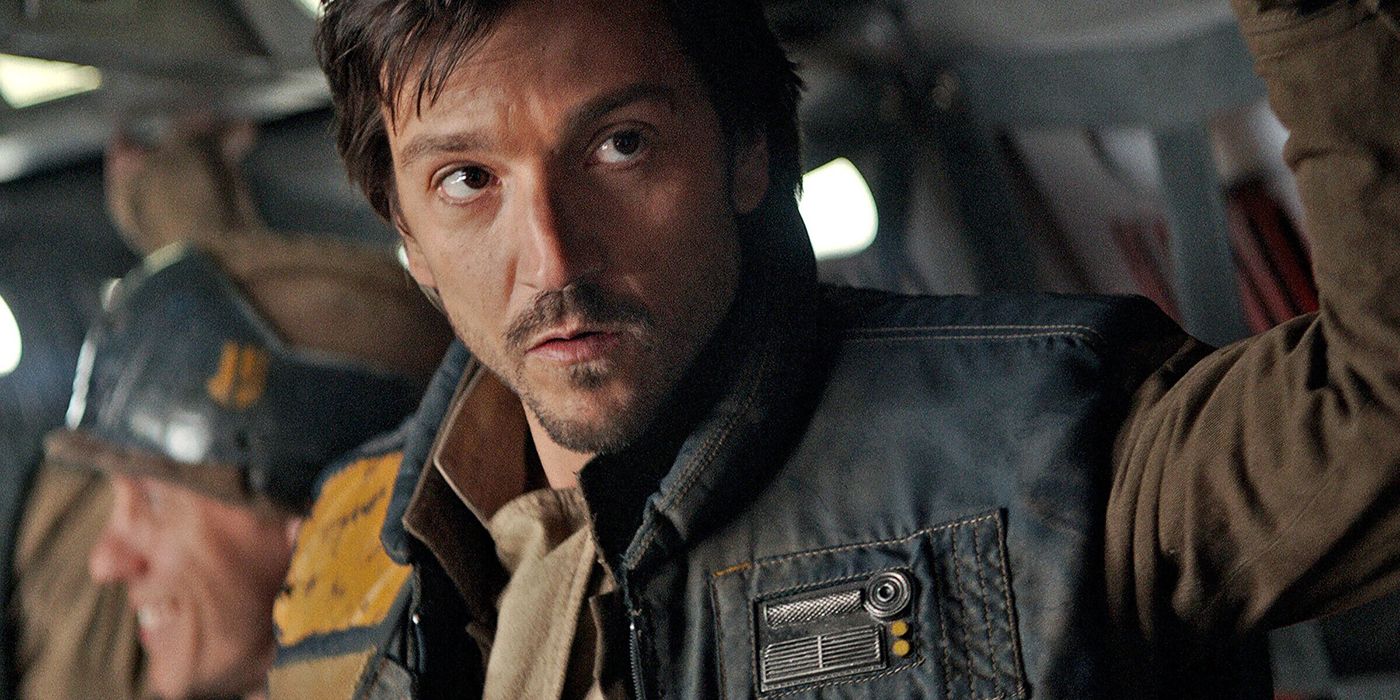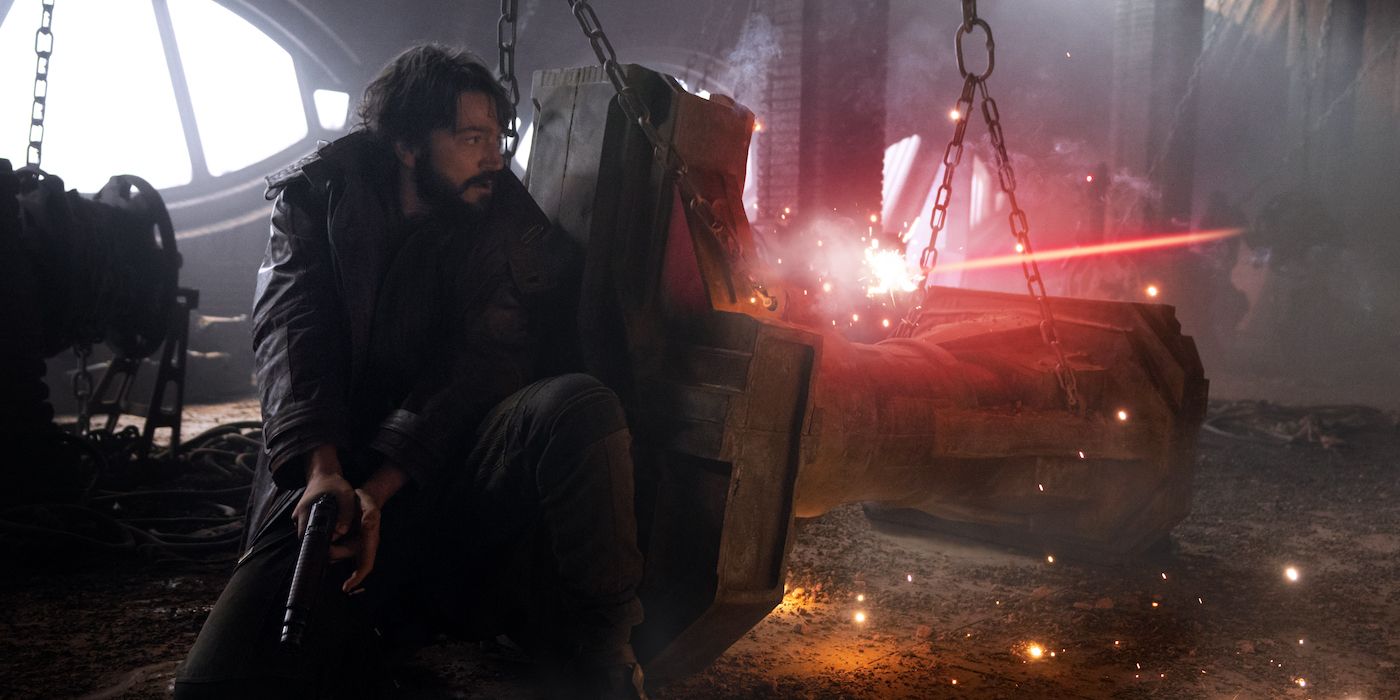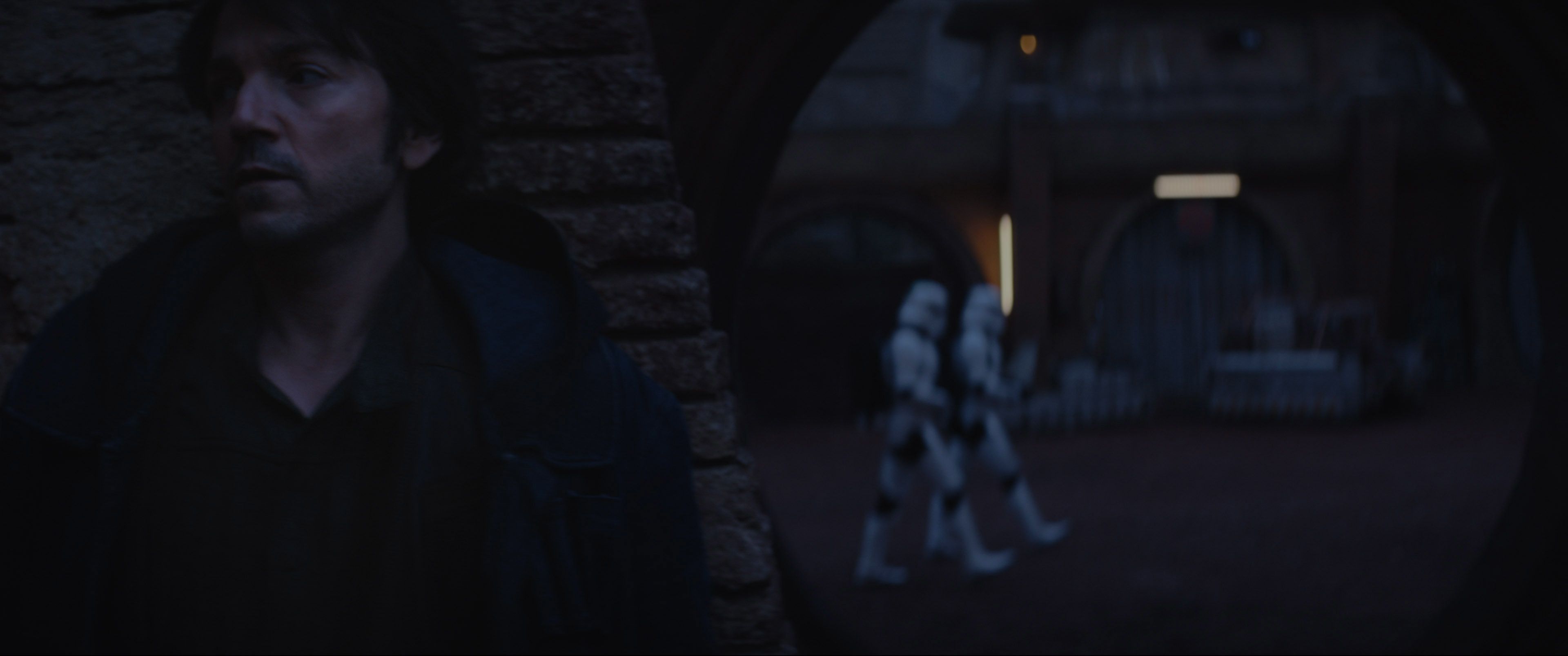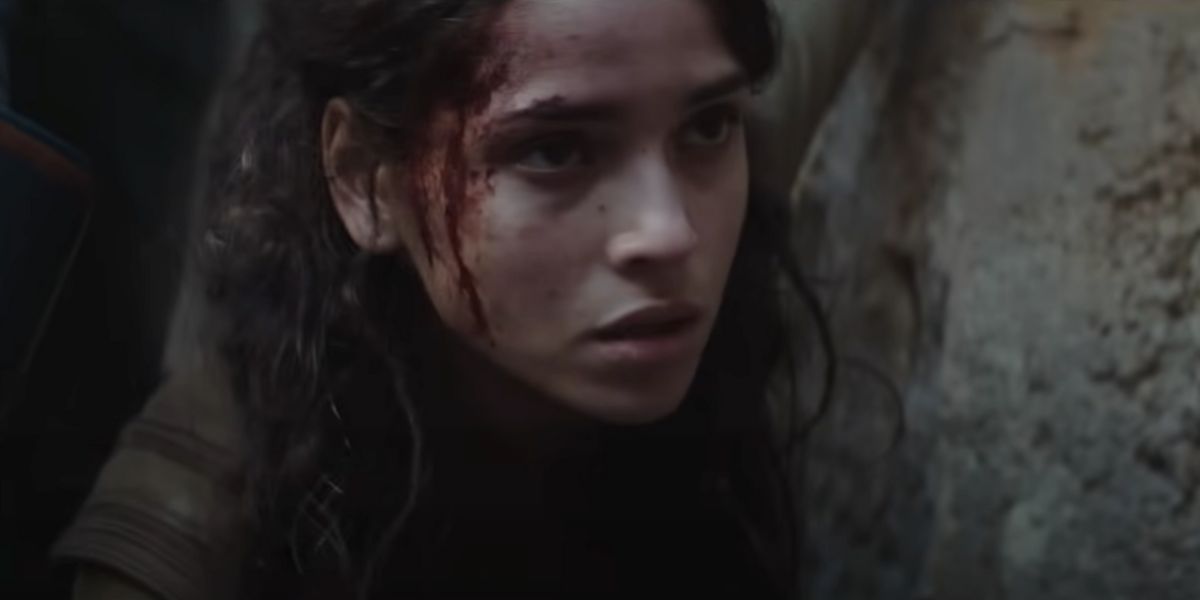From creator/showrunner Tony Gilroy, the 12-episode first season of the Disney+ series Andor is set five years before the events of Rogue One and follows Cassian Andor (Diego Luna) on his journey toward becoming a rebel hero. While it might seem like he has a long way to go before he gets there, every revolution has to start somewhere and Cassian will have to figure out his place in the fight against the Empire.
During this conference to promote the series that is set to last for 24 episodes over two seasons, Gilroy and Luna (who’s also an executive producer) talked about this new perspective on the Star Wars galaxy, expanding Cassian Andor’s story, what makes the story so relevant to today, the dedicated Star Wars community, how physically challenging the stunts can be, what it means to be a part of this series, and what sets Andor apart from other Star Wars shows.
Question: Tony, this series is a new perspective on the Star Wars galaxy, involving the burgeoning rebellion in its infancy, in the years prior to Rogue One. What inspired you to create the series, and what was your vision for it?
TONY GILROY: The main idea is that we have a character in Rogue One, and we know where he ends up, and we know how accomplished and complicated he is. The idea that we can do a story that takes him literally from his childhood origins and walks him through a five-year history of an odyssey that takes him to that place, during a revolution and during a moment in history in a place where huge events are happening, and real people are being crushed by it, the fact that we could follow somebody as an example of a revolution, all the way through to the end, was the appeal for me. That was the buy-in. There are a lot of characters in our show, and everyone is going to be circulating and spinning and intersecting around the Cassian Andor story, as we move towards Rogue One. It’s a potent moment in history. A lot of people are facing a lot of really difficult times and difficult decisions, along the way. That’s what the show is about. The opportunity to do that on a large scale and big canvas is why I’m here.
Diego, what do you find most exciting about stepping back into the role of Cassian Andor? Do you have more of a sense of completing the character in this series, filling in the details and your understanding of him?
DIEGO LUNA: Definitely. First of all, just the chance to be back working with this family, getting to do more stuff with Tony, who is someone I admire and I love his company. Collaborating with him is amazing, so it just felt great being back. Rogue One is a film about an event. You don’t get to know those characters. You don’t get to understand exactly where they come from, or what needed to happen. For me, it’s quite relevant today to tell the story of what needs to happen for a revolutionary to emerge, to exist, to come to live. What gives meaning in the life of someone to be willing to sacrifice everything for a cause? What needs to happen? That journey matters to me. The character says stuff that haunted me with Rogue One. He started to fight since he was six years old. What does that mean, exactly? Why would a six-year-old miss his childhood and start a fight? That, to me, is really interesting to know. He talks about a dark past. He talks about doing terrible stuff for the Rebellion. What is he referring to? I think that story matters. That story is interesting. There is a lot of material there for us to play. I was really excited to be able to go into that journey and give those answers.
Tony, this story feels so big, and yet really grounded in reality. Who do you see as the audience? Who do you think this story will appeal to?
GILROY: The show exists because there’s an enormous, arterial, important, passionate Star Wars community, and I know it’s not a monolithic community. There are many different version and factions within it, but there’s a huge dedicated Star Wars community that shows up. That’s our whole card. That’s what gave us the money and the momentum and the ability to make a show that’s this insanely big, this abundant, and this difficult to make. That audience is our primary concern. We want to bring something to them that is in a completely different lane than what they’ve had before, but we’re doing it in a completely uncynical fashion. There’s nothing cynical about our show. The word we use every day is real. We want to make this real. This place is real to us. We will bring a lot of things to that community that we hope they’re really interested in, and we hope they really appreciate it. We hope they really appreciate the passion we have to try to make it real. At the same time, it’s no secret that a lot of people are Star Wars adjacent or Star Wars averse, and they should also be able to watch our show. Our show is designed so that this could be your entry point into Star Wars. You could watch our 24 episodes, and that could be your way in. We’re doing a show that does not require any prior knowledge whatsoever to get involved. Our hope and the game is, can we satisfy and electrify and excite the dedicated fans and, at the same time, bring something that’s so intense emotionally, seems so true, has the smallest domestic dramas and the smallest interpersonal relationships, dropped down in the midst of the epic, tectonic, revolutionary, historical moments where people have to make huge decisions? Can we attract another audience that’s interested in that, as well? Can we marry those two things together? That’s what we’re trying to do, and that’s why we’re here.
Diego, what did you want to explore the most, when it came to Cassian and his past?
LUNA: How far can someone be from learning that he could be a tool of change? How far can you be from that and still find your way into acknowledging that you are capable of big stuff? How far can we find Cassian? You see the guy in the first episode, and you don’t see any possibility of that happening. That to me gives me hope, in the world we live in. If that’s possible, anyone can do something. We can all find out what we are capable of. It’s about what we find and the people we meet in our journey. I always thought of him as a character that has been forced to move, therefore he brings a pain that he’s carrying, that is making him very cynical about life. Exploring that person, and then finding a way to get the clarity of someone that suddenly starts believing, can give you enough strength to be useful and to bring change. I thought that story matters. It’s a story I would like to tell to my kids and my friends. It’s a story that I would like to see, as an audience. We pretend to be in a galaxy far, far away, but this story matters today, in the world we live in. Otherwise, I wouldn’t care. I always saw the potential in this story.
When you think about this shoot, what are the moments or highlights that stand out?
LUNA: There are many, of course. It was the first or second day that I arrived to Pinewood, at the very beginning, when we were in pre-production. I go to do the stunts, where they have an amazing facility, and stuff for you to climb and jump and fall and roll. I go, “Let’s do a very simple one. I need to get back into this.” I pretend I’m 10 years younger than what I had to play in this show. And then, the next morning, I was like, “Shit, I’m gonna have to quit this job. I can’t handle this anymore.” Every part of my body ached. I felt like I went into a battle, and it was just the first rehearsal. I was talking to my family saying, “I don’t know if I’m gonna be able to do this. No one’s gonna believe me. I’m gonna have to spend the first two months in a chair.” Time passed and, gladly, there was a fantastic stunt person that helped me and managed to do all the stuff I can’t do anymore.
Tony, were there any specific real-world inspirations for Andor’s home world?
GILROY: Just life. I grew up in upstate New York. I won’t go into details about it, but it was a blue-collar place and everybody always had jobs. When you were 12, you went out and got working papers. It was an odd thing. I worked for masons. I was a plumber’s apprentice. I had all kinds of jobs. I ran a painting company. It’s an idealized fantasy of mine, I suppose, of a community that’s been stable and benevolent and thriving. We don’t really have any economic diversity there. I suppose it’s my utopian mechanical side fantasy. Our production designer, Luke Hull, who did Chernobyl, is in the brain trust that put the show together. He’s Mozart. He’s a young production designer, and he’s just soaring. They built an eight-and-a-half-acre city for us, that we used for all 12 episodes. It’s a 360 set. The community that we were allowed to build within it, and the social structures and the rituals of it, because there are some really intense rituals about it, really feels like a place with a whole culture, a whole life, and a whole tradition. It’s a fantastic maximal expression of imagination to be able to do this. It’s just fantastic to be able to do it. It’s thrilling.
Diego, what does it mean to you, to get to be a part of a show like this?
LUNA: I think the industry is reacting to some things happening out there. We’re supposed to be a mirror for audiences to be able to see themselves. With the platforms now and these new ways to connect with audiences, they’re sending the right messages and the industry is reacting. When you buy a ticket, you send a message. When you don’t buy a ticket, you also send a message. When you click, you send a message. When you don’t click, you send a message. The industry will respond to that, and that’s what’s happening. If we’re talking about a galaxy where there are so many planets, it makes sense that people come from different places. If we’re talking about refugees, they come from different places. They gather in one place, and they sound and look different. That diversity is what makes the reality I live in very rich. I celebrate the stories that we see reflect that.
How do you hope Andor will stand out from the other Star Wars shows that are currently available?
LUNA: First of all, this one is written by Tony Gilroy, which makes it very special. Tony is not a writer that lives in the language of right and wrong, or black and white. He spends his time in the complexity of the gray areas and the contradictions of the characters. That’s where I think this real thing comes out of. It’s full of that experience of being someone trying to live your life and having to make choices. This is a show about real people. It’s very dark times in the galaxy. There are no Jedis around. These people having have to articulate a reaction to oppression. It’s the most grounded kind of Star Wars that you’ll get. It’s a show about us. It’s a show about these people finding the strength to come up with a reaction to change, and to bring change to their reality. It’s very inspiring. It’s huge. It’s adventure and action at its best. It’s what you expect from Star Wars, but then it gets very intimate. It’s very subtle, and it takes time to understand each character. It has time for each storyline. I just think it’s very rich and powerful, and people are hopefully gonna like it.
Andor premieres September 21st on Disney+ with the first three episodes.




